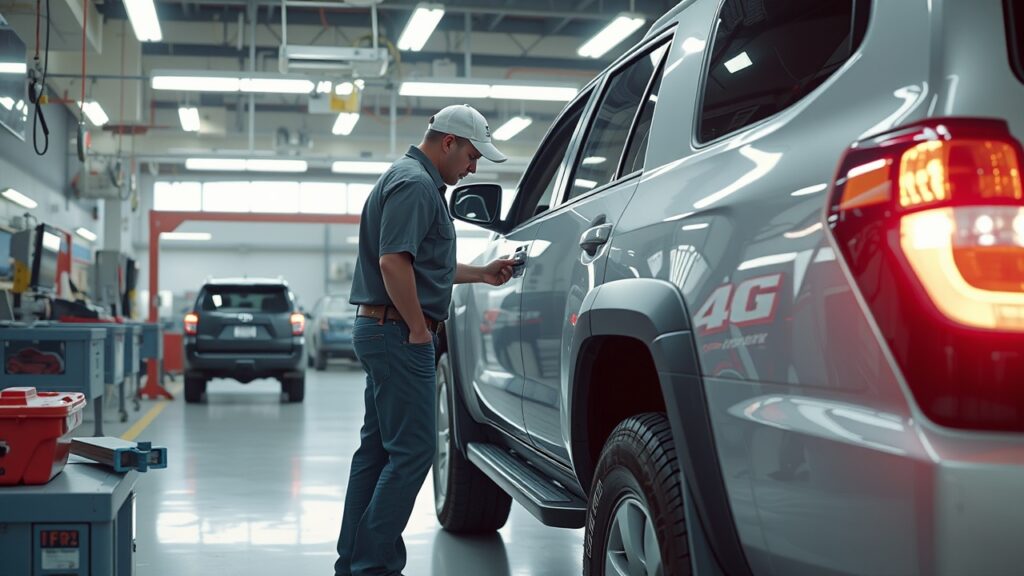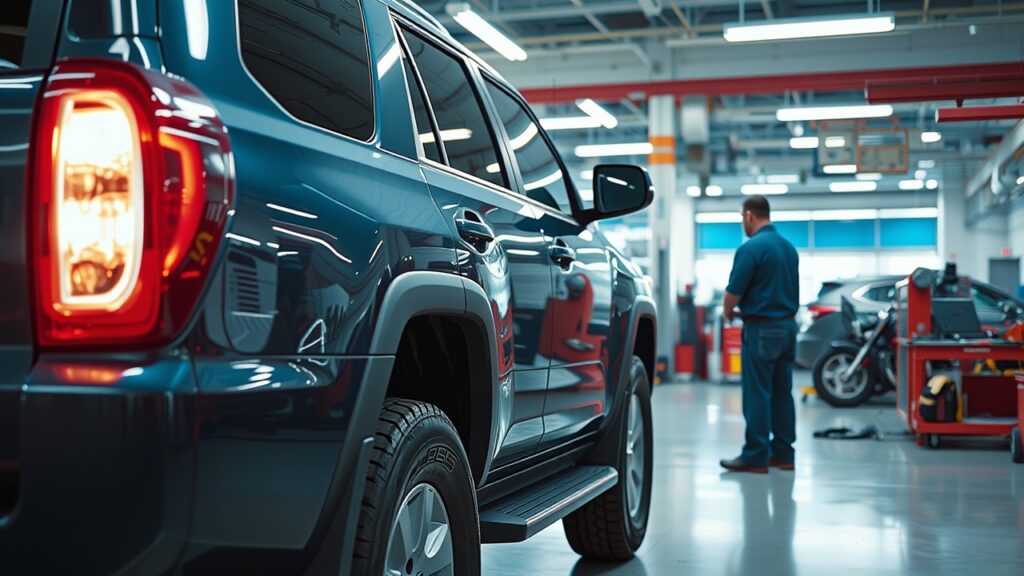The brake light system on your 2011 Toyota 4Runner is an essential component of your vehicle’s safety features. It alerts other drivers when you are slowing down or stopping, ensuring safe travel on the road.
However, like all vehicle systems, it’s not immune to issues that can compromise its function. If your brake lights aren’t working properly, it’s crucial to diagnose and address the issue quickly to ensure your safety and that of others.
This article will help you understand common brake light problems in your 2011 Toyota 4Runner, how to troubleshoot them, and whether a dealer can diagnose and fix the issue quickly.
We will also touch on related aspects like fluid levels, brake pads, and other components that could be affecting the performance of your brake lights.
Additionally, we’ll answer frequently asked questions and provide some tips for maintaining your brake system to avoid future issues.

Troubleshooting Brake Light On: Fluid, Pads & More
When the brake light comes on in your 2011 Toyota 4Runner, it can signal a variety of issues. While many drivers may assume that the light is simply indicating a problem with the brake lights themselves, it’s important to understand that it could also be tied to several other components in your braking system. Let’s explore some of the most common causes for a brake light issue in your 4Runner.
1. Low Brake Fluid
One of the most common reasons why your brake light may illuminate is low brake fluid. The brake system in your 4Runner relies on hydraulic pressure, which is created by the brake fluid. When the fluid level gets low, it can trigger the brake warning light on your dashboard.
Low brake fluid can be caused by several factors, including:
- Brake fluid leaks: Leaking brake lines or brake calipers can cause fluid to leak out, triggering the brake light.
- Normal wear: Brake fluid gradually depletes as the brake pads wear down. If the fluid hasn’t been topped up recently, it may be low.
- Contaminated fluid: Over time, brake fluid can absorb moisture, which can reduce its effectiveness and cause the brake light to come on.
What You Can Do:
To check your brake fluid, locate the reservoir, which is usually near the driver’s side of the engine compartment. If the fluid is low, top it up with the appropriate type of brake fluid as specified in your owner’s manual.
If the fluid level is low and the brake system is working fine, you might be dealing with a leak or other underlying issue, which requires professional diagnosis.

2. Worn Brake Pads
Another reason for the brake light illuminating in your 2011 Toyota 4Runner could be worn brake pads. The brake pads are designed to wear down gradually as they make contact with the brake rotor. When they become too thin, the brake system can trigger the warning light.
What You Can Do:
Inspect the brake pads by visually checking them through the wheel or removing the wheel for a closer inspection. If the brake pads are worn down to less than 3 millimeters, they should be replaced.
In some cases, the brake system may also trigger the light when the pads are close to their limit, warning you to replace them soon.
3. Faulty Brake Light Switch
If the brake lights themselves are malfunctioning (e.g., they stay on when they shouldn’t, or they don’t illuminate when you press the brake pedal), the issue could lie with the brake light switch.
This switch is usually located near the brake pedal and activates the brake lights when you apply pressure to the pedal.
If this switch fails, it can cause the brake lights to stop working, or they may stay on even when you release the pedal. This can be a simple and inexpensive fix, but it can also lead to issues with other safety features, so it’s essential to replace the switch when it’s faulty.
4. ABS System Issues
The Anti-lock Braking System (ABS) in your 2011 Toyota 4Runner is designed to prevent the wheels from locking during hard braking, which helps maintain steering control. If there is a problem with the ABS system, it could also cause the brake light to come on. A faulty ABS sensor or pump can trigger a warning light, alerting you to the problem.
What You Can Do:
If your brake light is accompanied by an ABS warning light or other unusual braking symptoms, you should have the ABS system checked by a professional mechanic. ABS issues can be more complex and often require specialized tools to diagnose.

Can the Dealer Diagnose Brake Light Problems Fast?
When a brake light issue occurs in your 2011 Toyota 4Runner, it’s essential to have it diagnosed quickly to prevent further damage or safety risks. Dealers are usually equipped with the tools and expertise necessary to identify the root cause of the problem.
Advantages of Going to the Dealer:
- Specialized Knowledge: Toyota dealers have specific knowledge of the make and model, ensuring that they can accurately diagnose and repair brake light issues.
- Access to OEM Parts: The dealership uses original equipment manufacturer (OEM) parts, which are designed specifically for your 4Runner. This ensures the best quality and performance.
- Advanced Diagnostic Tools: Toyota dealerships have state-of-the-art diagnostic equipment that can quickly identify issues with the brake system, ABS system, or even electrical problems that may be affecting the brake lights.
Disadvantages of Going to the Dealer:
- Cost: Dealerships often charge more for labor and parts than independent mechanics.
- Time: Depending on the dealership’s workload, it could take longer to get an appointment or repair completed.
- Possible Upselling: Some dealers may recommend unnecessary repairs or services.
If you prefer to avoid dealership costs, you can also visit an independent auto repair shop with experience in Toyota vehicles. Many reputable shops can quickly diagnose brake light issues, though they may not have access to the same specialized diagnostic equipment as the dealer.
Size Mattress Fit and Tow Ball – What Do They Have to Do With Brake Light Issues?
While these topics might seem unrelated, they can be important considerations when diagnosing problems related to your 2011 Toyota 4Runner’s overall functionality.
- Size Mattress Fit: When towing or loading the vehicle with cargo, the extra weight can strain various systems, including the brake system. If you’re using your 4Runner to haul a large mattress or other heavy load, make sure that your vehicle is within its weight limits. Overloading the vehicle can put undue pressure on the brakes, leading to issues such as reduced braking power or premature wear of the brake components.
- Tow Ball: If you’re using your 4Runner for towing, the tow ball and trailer setup could affect braking performance, especially if the brake lights are connected to a trailer. Ensure that your trailer wiring is properly installed and functioning, as faulty connections could trigger false warnings or cause issues with the brake lights.
FAQS
1. Why is my brake light on but my brake pads are fine?
The brake light can come on for several reasons, even if your brake pads are in good condition. Common causes include low brake fluid, a faulty brake light switch, or problems with the ABS system. A professional diagnostic is necessary to pinpoint the exact issue.
2. How much does it cost to fix brake light problems in a 2011 Toyota 4Runner?
The cost of repairing brake light problems can vary depending on the issue. Replacing the brake light switch can cost around $100 to $150, while repairing leaks or replacing brake pads may be more expensive. If the issue is with the ABS system, repairs could range from $200 to $1,000 or more, depending on the problem.
3. Can I fix brake light issues myself?
If the issue is something simple, like replacing a blown bulb or topping up brake fluid, you may be able to fix the problem yourself. However, if you suspect a deeper issue with the braking system, it’s always best to consult a professional mechanic.
4. How often should I check my brake fluid in a 2011 Toyota 4Runner?
It’s a good idea to check your brake fluid levels every 3,000 to 5,000 miles during routine maintenance, especially if you notice any issues with braking performance.
5. Will towing a trailer cause my brake light to come on?
Towing can affect your brake system, especially if the trailer is overloaded or if the trailer’s wiring is faulty. Make sure the trailer’s lights are properly connected and that the total weight being towed doesn’t exceed your 4Runner’s towing capacity.
Conclusion:
By staying on top of brake system maintenance and addressing any issues promptly, you can keep your 2011 Toyota 4Runner safe and roadworthy.
Whether you visit a dealer or take your vehicle to an independent mechanic, getting the brake light issue diagnosed and fixed is crucial for both your safety and the safety of other drivers on the road.










